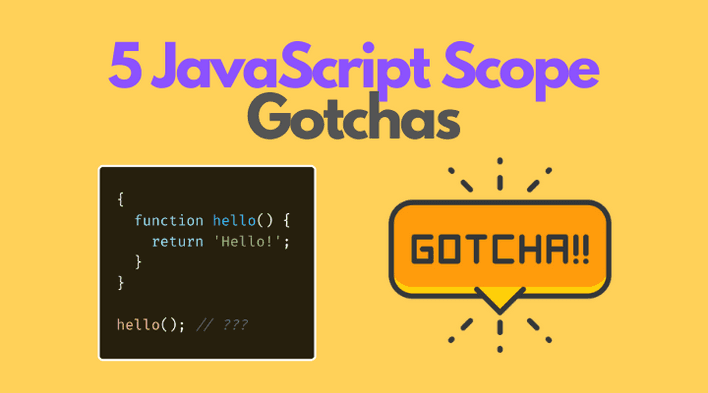In JavaScript, a code block, a function, or module create scopes for variables. For example, the if code block creates a scope for the variable message:
if (true) { const message = 'Hello'; console.log(message); // 'Hello'}console.log(message); // throws ReferenceError
message is accessible inside the scope of if code block. However, outside of the scope, the variable is not accessible.
Ok, that was a short intro to scopes. If you'd like to learn more, I recommend reading my post JavaScript Scope Explained in Simple Words .
What follows are 5 interesting cases when the JavaScript scope behaves differently than you expect. You might study these cases to improve your knowledge of scopes, or just to prepare for a fancy coding interview.
1. var variables inside for cycle
Consider the following code snippet:
const colors = ['red', 'blue', 'white'];for (let i = 0, var l = colors.length; i < l; i++) { console.log(colors[i]); // 'red', 'blue', 'white'}console.log(l); // ???console.log(i); // ???
What happens when you log l and i variables?
The answer
console.log(l) logs the number 3, while console.log(i) throws a ReferenceError.
The l variable is declared using a var statement. As you might know already, var variables are scoped only by a function body and not by a code block.
On the opposite, the variable i is declared using a let statement. Because let variables are block scoped, i is accessible only within the scope of for cycle.
The fix
Change l declaration from var l = colors.length to const l = colors.length. Now the variable l is encapsuled inside for cycle body.
2. function declaration inside code blocks
In the following code snipped:
// ES2015 env{ function hello() { return 'Hello!'; }}hello(); // ???
What happens when you invoke hello()? (consider the snippet is executed in ES2015 environment)
The answer
Because the code block creates a scope for the function declaration, invoking hello() (in ES2015 environment) throws ReferenceError: hello is not defined.
Interestingly that in a pre-ES2015 environment executing the above code snippet works without throwing errors. Do you know why? If so, please write your answer in a comment below!
3. Where can you import a module?
Can you import a module inside a code block?
if (true) { import { myFunc } from 'myModule'; // ??? myFunc();}
The answer
The script above would trigger an error: 'import' and 'export' may only appear at the top-level.
You can import a module only at the topmost scope of the module file, also named the module scope.
The fix
Always import modules from the module scope. Plus a good practice is to place the import statements at the beginning of the source file:
import { myFunc } from 'myModule';if (true) { myFunc();}
ES2015 modules system is static. The modules dependencies are determined by analyzing the JavaScript source code, without executing it. Thus you cannot have import statements inside code blocks or functions since they are executed during runtime.
4. Function parameters scope
Consider the following function:
let p = 1;function myFunc(p = p + 1) { return p;}myFunc(); // ???
What happens when myFunc() is invoked?
The answer
When the function is invoked myFunc(), an error is thrown: ReferenceError: Cannot access 'p' before initialization.
It happens because the function parameters have their own scope (separated from the function scope). The parameter p = p + 1 is equivalent to let p = p + 1.
Let's take a closer look at p = p + 1.
First, a variable p is defined. Then JavaScript tries to evaluate the default value expression p + 1, but the binding p is already created but not yet initialized (the variable let p = 1 of the outer scope is not accessed). Thus an error is thrown that p is accessed before initialization.
The fix
To fix the problem, you can either rename the variable let p = 1, or rename the function parameter p = p + 1.
Let's choose to rename the function parameter:
let p = 1;function myFunc(q = p + 1) { return q;}myFunc(); // => 2
The function parameter was renamed from p to q. When the invocation happens myFunc(), the argument is not specified, thus the parameter q is initialized with a default value p + 1. To evaluate p + 1, the variable p of the outer scope is accessed: p + 1 = 1 + 1 = 2.
5. Function declaration vs class declaration
The following code defines a function and a class inside of a code block:
if (true) { function greet() { // function body } class Greeter { // class body }}greet(); // ???new Greeter(); // ???
Are both greet and Greeter accessible outside of the block scope? (consider ES2015 environment)
The answer
Both function and class declarations are block scoped. So invoking the function greet() and constructor new Greeter() outside of if code block scope throw a ReferenceError.
6. Summary
Care must be taken with var variables because they are function scoped, even being defined inside a code block.
Because the ES2015 modules system is static, you have to use the import syntax (as well as export) at the module scope.
The function parameters have their scope. When setting up a default parameter value, be sure that the variables inside the default expression are initialized with values.
In an ES2015 runtime environment, the function and class declarations are block scoped. However, a pre-ES2015 env, the function declarations are only function scoped.
Hopefully, these gotchas have helped you solidify your scope knowledge!
What other scope gotchas have you encountered?


